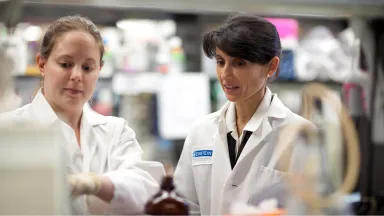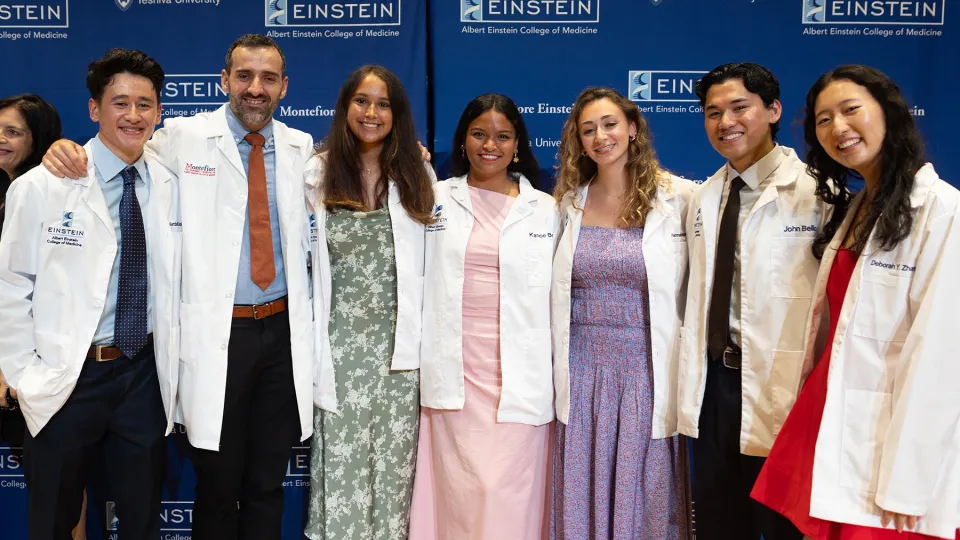
Yaron Tomer, M.D.
- Professor, Department of Medicine (Endocrinology)
- Professor, Department of Microbiology & Immunology
- The Marilyn and Stanley M. Katz Dean, Albert Einstein College of Medicine
Area of research
- 1. Immunogenetics of autoimmune Thyroid disease (AITD) and type 1 diabetes (T1D) , 2.Gene-environment interactions in AITD and T1D , 3. Epigenetics of AITD and T1D , 4. Environmental chemical triggers of T1D
Location
- Albert Einstein College of Medicine Jack and Pearl Resnick Campus 1300 Morris Park Avenue Belfer Building 312 Bronx, NY 10461
Research Profiles
Professional Interests
Dr. Yaron Tomer is the Marilyn and Stanley M. Katz Dean at Albert Einstein College of Medicine and Chief Academic Officer at Montefiore Medicine.
He received his M.D. degree magna cum laude from the Sackler School of Medicine of Tel Aviv University and trained in Internal Medicine at Sheba Medical Center, Israel, and in Endocrinology at the Icahn School of Medicine at Mount Sinai in New York. Prior to joining Montefiore Einstein in March 2016, he was Chief of the Division of Endocrinology, Diabetes, and Bone Disease at Mount Sinai.
Dr. Tomer has served on the editorial boards of Endocrinology and The Journal of Clinical Endocrinology and Metabolism, among others. He is a member of the American Society for Clinical Investigation and a Fellow of the American College of Physicians. Dr. Tomer is the recipient of several prestigious awards, including the American Thyroid Association’s Sidney H. Ingbar Distinguished Lectureship Award, as well as its Van Meter Award.
Research
Dr. Tomer’s research program focuses on the immunogenetic, epigenetic, and environmental mechanisms underlying thyroid autoimmunity, and type 1 diabetes, and on targeting these mechanisms in order to develop novel therapies. His group made several discoveries including identifying new genes and mechanisms underlying the strong association between type 1 diabetes and autoimmune thyroiditis; demonstrating that CD40 and thyroglobulin are major susceptibility genes for thyroid autoimmunity; identifying a unique amino acid variant in the peptide binding pocket of HLA-DR that is key for the development of thyroid autoimmunity; dissecting the epigenetic mechanisms by which polymorphisms in the thyroglobulin and TSHR genes interact with environmental agents (e.g. viruses) to trigger thyroid autoimmunity; and identifying a novel small molecule that can block antigen presentation in autoimmune thyroiditis.
Current Projects
- Genetic and epigenetic studies in thyroid autoimmunity
The Tomer lab mapped several susceptibility genes for autoimmune thyroid diseases (AITD) including CD40, thyroglobulin, and TSHR. Recent data suggest that variants in regulatory regions of some of these genes interact epigenetically with environmental factors (e.g., viral infections) to trigger disease. Current studies are using epigenomic screening, including whole genome methylation studies and ChiP-seq analyses to study these genetic-epigenetic interactions. - Epigenetic studies in type 1 diabetes
Similar studies are utilizing epigenomic screening to analyze epigenetic interactions between known type 1 diabetes susceptibility genes and interferon alpha, a key cytokine secreted during viral infections. - Translational studies in autoimmune thyroiditis (AITD) and type 1 diabetes
The Tomer lab discovered that the presence of arginine at position beta-74 of the peptide binding pocket of HLA-DR is critical for the development of AITD. This discovery led to a translational project aimed at blocking thyroid antigen presentation to T-cells by the arginine beta-74 HLA-DR peptide binding pocket as a potential therapy for AITD. Recently, the Tomer lab identified a small molecule, Cepharanthine, that can block antigen presentation and suppress AITD in mouse models. Similar studies are performed in type 1 diabetes where the aim is to block the HLA-DQ8 peptide binding pocket from presenting insulin peptides to T-cells as a novel strategy to treat autoimmune diabetes. - Genetic and functional analyses of autoimmune polyglandular syndrome (APS) type 3
The co-occurrence of type 1 diabetes and autoimmune thyroiditis in the same individual is considered a variant of the APS type 3 syndrome. The Tomer lab discovered several new susceptibility genes for APS3. The lab is now analyzing the mechanisms by which these genes predispose to disease. - The role of viruses in triggering autoimmune thyroiditis and type 1 diabetes
Certain infections, such as hepatitis C, are associated with autoimmune thyroiditis and diabetes. Current studies are aimed at dissecting the mechanisms by which interferon alpha, the primary cytokine secreted during viral infections, can trigger autoimmune thyroiditis and diabetes in genetically susceptible individuals.
Selected Publications
- Menconi F, Monti MC, Greenberg DA, Oashi T, Osman R, Davies TF, Ban Y, Jacobson EM, Concepcion ES, Li CW, Tomer Y. Molecular amino acid signatures in the MHC class II peptide binding pocket predispose to autoimmune thyroiditis in humans and in mice. Proc Natl Acad Sci USA 2008; 105: 14034-14039.
- Jacobson EM, Yang H, Menconi F, Wang R, Osman R, Skrabanek L, Li CW, Fadlalla M, Gandhi A, Chaturvedi V, Smith EP, Schwemberger S, Osterburg A, Babcock GF, Tomer Y. Employing a recombinant HLA-DR3 expression system to dissect MHC II-thyroglobulin peptide dynamism: A genetic, biochemical, and reverse immunological perspective. J Biol Chem 2009; 284: 34231-34243.
- Villano MJ, Huber AK, Greenberg DA, Golden BK, Concepcion E, Tomer Y. Autoimmune thyroiditis and diabetes: Dissecting the joint genetic susceptibility in a large cohort of multiplex families. J Clin Endocrinol Metab 2009; 94: 1458-1466.
- Menconi F, Osman R, Monti MC, Greenberg DA, Concepcion ES, Tomer Y. Shared molecular amino acid signature in the HLA-DR peptide binding pocket predisposes to both autoimmune diabetes and thyroiditis. Proc Natl Acad Sci USA 2010; 107: 16899-16903.
- Menconi F, Huber A, Osman R, Concepcion E, Jacobson EM, Stefan M, David, CS, Tomer Y. Tg.2098 is a major human thyroglobulin T-cell epitope. J Autoimmun 2010; 35: 45-51.
- Stefan M, Jacobson EM, Huber AK, Greenberg DA, Li CW, Skrabanek L, Concepcion E, Fadlalla M, Ho K, Tomer Y. Novel variant of thyroglobulin promoter triggers thyroid autoimmunity through an epigenetic interferon alpha-modulated mechanism. J Biol Chem 2011; 286: 31168-31179.
- Huber AK, Finkelman FD, Li CW, Concepcion E, Smith E, Jacobson E, Latif R, Keddache M, Zhang W, Tomer Y. Genetically driven target tissue overexpression of CD40: A novel mechanism in autoimmune disease. J Immunol 2012; 189: 3043-3053.
- Stefan M, Wei C, Lombardi A, Li CW, Concepcion ES, Inabnet WB 3rd, Owen R, Zhang W, Tomer Y. Genetic-epigenetic dysregulation of thymic TSH receptor gene expression triggers thyroid autoimmunity. Proc Natl Acad Sci USA 2014; 111: 12562-12567.
- Tomer Y, Dolan LM, Kahaly G, Divers J, D’Agostino Jr. RB, Imperatore G, Dabelea D, Marcovina S, Black MH, Pihoker C, Hasham A, Hammerstad SS, Greenberg DA, Lotay V, Zhang W, Monti MC, Matheis N. Genome wide identification of new genes and pathways in patients with autoimmune thyroiditis and type 1 diabetes. J Autoimmun 2015; 60: 32-39.
- Li CW, Menconi F, Osman R, Mezei M, Jacobson EM, Concepcion E, David CS, Kastrinsky DB, Ohlmeyer M, Tomer Y. Identifying a small molecule blocking antigen presentation in autoimmune thyroiditis. J Biol Chem 2016; 291: 4079-4090.
- Li CW, Osman R, Menconi F, Concepcion ES, Tomer Y. Flexible peptide recognition by HLA-DR triggers specific autoimmune T-cell responses in autoimmune thyroiditis and diabetes. J Autoimmun 2017; 76: 1-9.
- Faustino LC, Lombardi A, Madrigal-Matute J, Owen RP, Libutti SK, Tomer Y. Interferon alpha triggers autoimmune thyroid diseases via lysosomal-dependent degradation of thyroglobulin. J Clin Endocrinol Metab 2018; 103: 3678-3687.
- Stefan-Lifshitz, M, Karakose E, Cui L, Ettela A, Yi Z, Zhang W, Tomer Y. Epigenetic modulation of β-cells by interferon-α via PNPT1-miR26a-TET2 triggers autoimmune diabetes. JCI Insight 2019; 4: e126663.
- Li CW, Osman R, Menconi F, Concepcion E, Tomer Y. Cepharanthine blocks TSH receptor peptide presentation by HLA-DR3: Therapeutic implications to Graves’ disease. J Autoimmun 2020; 108: 102402.
- Lombardi, A, Concepcion E, Hou H, Arib H, Mezei M, Osman R, Tomer Y. Retro-inverso D-peptides as a novel targeted immunotherapy for type 1 diabetes. J Autoimmune 2020; 115: 102543.
- Li CW, Sachidanandam R, Jayaprakash A, Yi Z, Zhang W, Stefan-Lifshitz M, Concepcion E, Tomer Y. Identification of new rare variants associated with familial autoimmune thyroid diseases by deep sequencing of linked loci. J Clin Endocrinol Metab 2021; 12: 691781.
- Ye J, Stefan-Lifshitz M, Tomer Y. Genetic and environmental factors regulate the type 1 diabetes gene CTSH via differential DNA methylation. J Biol Chem 2021; 296: 100774.
- Li CW, Osman R, Menconi F, Faustino LC, Kim K, Clarke OB, Hou H, Tomer Y. Cepharanthine blocks presentation of thyroid and islet peptides in a novel humanized autoimmune diabetes and thyroiditis mouse model. Front Immunol 2021; 12: 796552.








